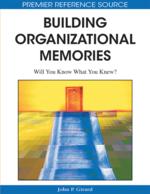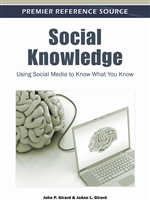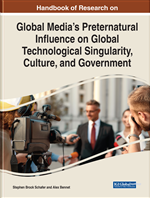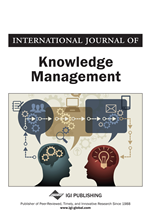Search
Results: 36
Archaeology and texts
Christ's College
Leaders, Decisions, and the Neuro-Knowledge System
Every decision-maker has a self-organizing, hierarchical set of theories (and consistent relationship among those theories) that guide their decision-making process. In support of this thesis the authors explore the following...
Cybernetics Computer Science and Information Technology Cognitive Informatics Business and Management Physical Sciences and Engineering
Published by: IGI Global Scientific Publishing
Associative Patterning
This chapter begins with a brief discussion of the basic concepts related to the unconscious life of an organization, and then addresses specific aspects of knowledge, learning, and memory, developing a language and framework...
Published by: IGI Global Scientific Publishing
Social Learning from the Inside Out
This chapter explores from the viewpoint of the mind/brain the factors and conditions which influence the social creation and sharing of knowledge. A foundation is developed by providing clear definitions of information...
Published by: IGI Global Scientific Publishing
Ethnohistory
Calouste Gulbenkian Foundation and University of Algarve
Seeking Global Coherence
Alex Bennet
Feb 11, 2022
The historical focus on relationships based on the trust and respect of people—initially family and then moving into business associates—has become idea focused, with value built on respect for and resonance with ideas....
Communication Studies Media and Communications Communications Theory Government and Law Social Sciences and Humanities
Published by: IGI Global Scientific Publishing
The Collision of the Experiential and Existential in the Brain/Heart-Mind/Soul Continuum
David Bennet
Feb 11, 2022
Focused in the physical, people are primarily experiential learners. Yet with the creation and sophistication of measurement techniques at the turn of the century, an understanding of experiential learning from the inside-out...
Communication Studies Media and Communications Communications Theory Government and Law Social Sciences and Humanities
Published by: IGI Global Scientific Publishing
Evaluating the Clinical Feasibility of an Artificial Intelligence-Powered, Web-Based Clinical Decision Support System for the Treatment of Depression in Adults
Christina Popescu, Grace Golden, David Benrimoh, Myriam Tanguay-Sela, Dominique Slowey, Eryn Lundrigan, Jérôme Williams, Bennet Desormeau, Divyesh Kardani, Tamara Perez, Colleen Rollins, Sonia Israel, Kelly Perlman, Caitrin Armstrong, Jacob Baxter, Kate Whitmore, Marie-Jeanne Fradette, Kaelan Felcarek-Hope, Ghassen Soufi, Robert Fratila, Joseph Mehltretter, Karl Looper, Warren Steiner, Soham Rej, Jordan F Karp, Katherine Heller, Sagar V Parikh, Rebecca McGuire-Snieckus, Manuela Ferrari, Howard Margolese, Gustavo Turecki
Jan 06, 2022
BACKGROUND: Approximately two-thirds of patients with major depressive disorder do not achieve remission during their first treatment. There has been increasing interest in the use of digital, artificial intelligence-powered...
Two new Linear B tablets and an enigmatic find from Bronze Age Pylos (Palace of Nestor)
Abstract
This article presents two newly-discovered fragments of Linear B tablets from recent excavations at the site of Ano Englianos, Bronze Age Pylos, along with a third...
Unveiling the Triagonal Dynamics of Absorptive Capacity 4.0
This study delves into the intricate relationship between Absorptive Capacity, Organizational Learning, and the Learning Organization. It introduces Absorptive Capacity 4.0, a dynamic framework that traces an organization's...
Published by: IGI Global Scientific Publishing
|
|< |
< |
1 |





